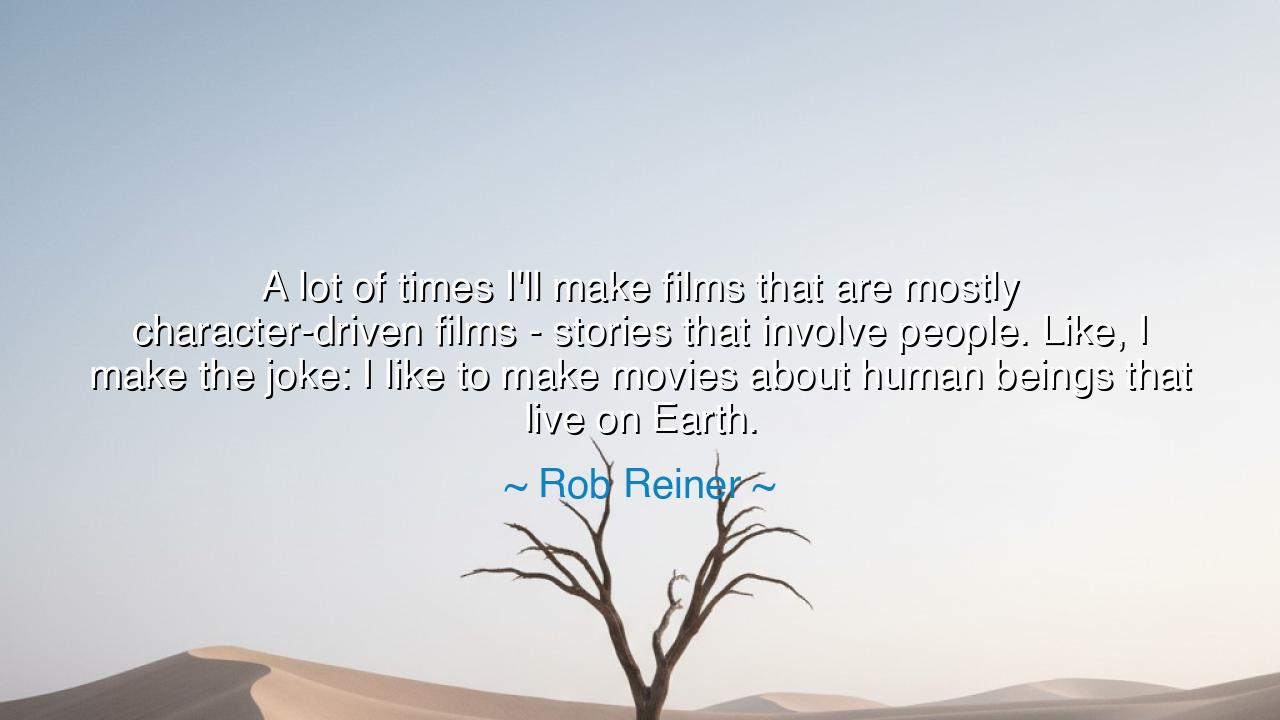
A lot of times I'll make films that are mostly character-driven
A lot of times I'll make films that are mostly character-driven films - stories that involve people. Like, I make the joke: I like to make movies about human beings that live on Earth.






Listen closely, O Seekers of Truth, to the words of Rob Reiner, who reflects on his approach to filmmaking with both humility and depth: "A lot of times I'll make films that are mostly character-driven films—stories that involve people. Like, I make the joke: I like to make movies about human beings that live on Earth." In these words, Reiner reveals the essence of his craft: a deep commitment to the portrayal of the human condition in its most authentic form. His statement, though made in jest, speaks to a profound truth about the power of storytelling—that the greatest stories are those that focus on the people within them, not on the spectacle or the external drama. It is the lives of human beings, in all their complexity, that hold the greatest power to move us.
In the ancient world, storytellers held a sacred place, for they were the ones who passed down the wisdom of the ages. The great epic poets like Homer in his Iliad and Odyssey, did not simply tell tales of gods and monsters, but of the humanness within those characters. Achilles, for instance, was not a mere warrior—he was a man filled with rage, grief, and a deep sense of duty. The ancient stories were always about more than just events—they were about the inner lives of the people who lived through those events. Homer’s works showed us that the greatest struggles, the deepest emotions, and the most profound lessons come from the complex nature of human beings. Reiner’s work echoes this ancient tradition: focusing not just on what happens, but on who happens to be involved, and the emotions, motivations, and conflicts that define them.
Reiner’s preference for character-driven films speaks to a deeper understanding of storytelling: that the heart of a story lies in its people. It is not the action, nor the settings, that truly draw us in—it is the characters, their struggles, their growth, and their interactions with each other. Think of the great works of Shakespeare, whose characters—whether it be the tortured Hamlet, the ambitious Macbeth, or the star-crossed Romeo and Juliet—are remembered not for the plot alone, but for their complexity, their humanity. Shakespeare’s characters live on because they reflect the very essence of being human—they are flawed, they make mistakes, they love, they hate, they aspire, they despair. Reiner, in focusing on human beings that live on Earth, is tapping into this ancient tradition, reminding us that the most profound stories are not those that transport us to faraway places, but those that ground us in our shared human experience.
Indeed, Reiner’s humor in referring to his films as stories about human beings living on Earth reveals the importance of relatability in art. The ancient Greeks understood this well. The theaters of Athens were filled with stories that focused on the very real human struggles of their time. The characters of Sophocles and Euripides were not meant to be mere abstractions; they were representations of the moral dilemmas, the suffering, and the courage that defined humanity. Through these stories, the audience was invited to reflect on their own lives, to see themselves in the characters’ actions and decisions. Reiner’s films, too, invite us into the lives of characters who feel like us, who face struggles that are grounded in the real world. It is this sense of authenticity that makes them so powerful.
In Reiner’s commitment to human-centered storytelling, we are reminded that the greatest stories are often the simplest ones—stories of everyday people, grappling with everyday issues. This is the essence of life itself: not grandiose, heroic feats, but the small, intimate moments that make us who we are. Take, for example, the ancient fables of Aesop, which often centered on animals behaving like humans, teaching simple moral lessons through their interactions. These stories did not require grand settings or spectacular events; they relied instead on the relatable, human qualities of honesty, greed, kindness, and wisdom. Reiner’s films, like these ancient tales, focus on the simplicity of human nature, allowing us to see ourselves in the struggles and triumphs of his characters.
The lesson, O Seekers, is clear: the stories that most profoundly shape us are not those of mythical gods or distant kings, but those of real people, living real lives. As Rob Reiner points out, the most powerful stories are the ones that reflect the human experience, stories that touch on our emotions, our flaws, and our dreams. Whether in film, in literature, or in the oral traditions of the ancients, the power of storytelling lies not in the external world it creates, but in the hearts and minds of the people who inhabit it.
Let us then, O Children, take this lesson into our own lives. Whether we are creators of art or humble travelers in the world, let us remember that our greatest influence comes from embracing our humanity, from being unafraid to confront our own emotions, fears, and desires. Like the ancient storytellers, we must seek to connect, to understand, and to reveal the truth of what it means to live on Earth—to be human. In doing so, we honor the stories of old, and continue the tradition of sharing the timeless lessons of the human experience.






AAdministratorAdministrator
Welcome, honored guests. Please leave a comment, we will respond soon